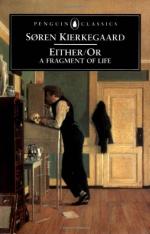
|
| Name: _________________________ | Period: ___________________ |
This test consists of 15 multiple choice questions and 5 short answer questions.
Multiple Choice Questions
1. What is a moment that is more significant than everything else in the entire world according to the author?
(a) Thoroughly enjoying a great party.
(b) Getting married.
(c) Becoming conscious in one's eternal validity.
(d) Taking in a sunset.
2. What does the author say concerns the young man?
(a) Either/Or.
(b) Nothing.
(c) Serious questions of philosophy.
(d) His parents.
3. The author claims there is the deepest relationship between what two things?
(a) A choice and the one who is choosing.
(b) Denmark and Norway.
(c) A choice and the people surrounding the person choosing.
(d) A man and woman who have gotten divorced.
4. According to the author how does philosophy view history?
(a) Philosophy sees history under the category of freedom.
(b) Philosophy sees history under the category of mathematics.
(c) Philosophy sees history under the category of meteorology.
(d) Philosophy sees history under the category of necessity.
5. What does the author call a poet-existence?
(a) A sin.
(b) A sacrifice.
(c) A delight.
(d) A drag.
6. What phrase does the young man fling about according to the author?
(a) "It takes one to know one."
(b) "It is not the given that is great, but the acquired."
(c) "A bird in the hand is worth two in the bush."
(d) "Too many cooks spoil the broth."
7. What capacity of the soul does the author say is missing in the young man?
(a) Logic.
(b) Wit.
(c) Memory of his life.
(d) Imagination.
8. According to the author, of what can the mystic not be absolved?
(a) A certain obtrusiveness in his relationship to God.
(b) Harboring anger toward his brother.
(c) Harboring lust in his heart.
(d) A certain exclusivity in his relationship with others.
9. What is the married man's most dangerous enemy according to the author?
(a) His conscience.
(b) His wife's suitors.
(c) His wife.
(d) Time.
10. What does the author say is another way to articulate the importance of living aesthetically?
(a) One must enjoy life.
(b) One must destroy life.
(c) One must marry well.
(d) One must find the truth.
11. What does the author claim the aesthetic is?
(a) The aesthetic is that by which a person spontaneously is what he is.
(b) The aesthetic is a mystery that is fundamentally unknowable.
(c) The aesthetic is that by which a person spontaneously arouses the essence of someone else.
(d) The aesthetic is that by which a person becomes what he becomes.
12. What does the author say is "the last to be satisfied"?
(a) The ear.
(b) The stomach.
(c) The heart.
(d) The eye.
13. What does the author say are the spheres proper to thought?
(a) All of these.
(b) History.
(c) Nature.
(d) Logic.
14. What natural need does every human being have according to the author?
(a) The need to formulate a life view.
(b) The need to find God.
(c) The need to marry.
(d) The need to exonerate himself.
15. The author accuses the young man of hardening his mind to what?
(a) The existence of right and wrong.
(b) Frittering away his intellectual life.
(c) To interpret all existence in aesthetic categories.
(d) Lusting after women day and night.
Short Answer Questions
1. What is everyone born with a penchant for according to the author?
2. What does the author write is on the other side of the aesthetic?
3. What does the author urge the young man to do with his "droll fancies"?
4. What does the author claim he has never passed himself off as?
5. Why must a captain of a ship make swift decisions about direction changes?
|
This section contains 618 words (approx. 3 pages at 300 words per page) |

|




